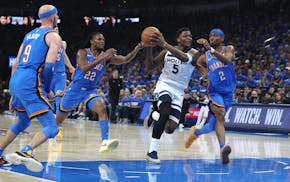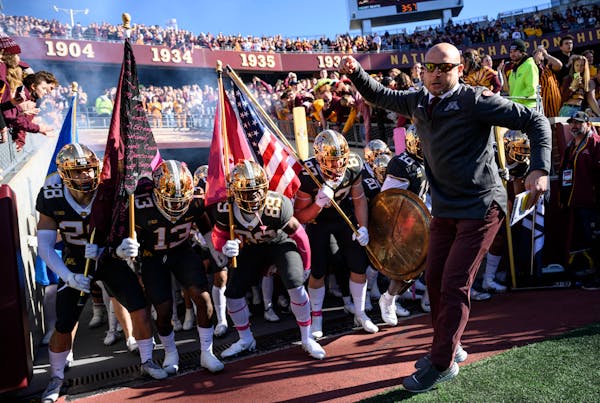Football can be a complicated game sometimes, a matrix of schemes and assignments and techniques smashed together every 30 seconds.
Other times, the picture is quite simple.
Exhibit A: The Gophers' 34-16 win over Maryland on Saturday.
That was a victory in strength. A game won in the trenches. The Gophers' big guys were far superior to Maryland's big guys.
If game balls were passed out, P.J. Fleck should have begun by distributing one to every offensive lineman (including tight ends) and every defensive lineman. Both sides dominated with relentless push. They pounded, and kept pounding, as if slamming a sledgehammer into drywall on a home project.
"We talked all week that it was going to have to be dirty, it was going to have to be nasty," Fleck said.
Dirty, nasty football isn't necessarily glamorous, but it was highly effective in this instance. The Gopher Grunts facilitated breakout performances by freshmen running backs Mar'Keise Irving and Ky Thomas and allowed the defense to hold the Terrapins 14 points below their scoring average.
It was a physical dismantling so thorough that it negated confounding game management by Fleck at the end of the first half.
Leading 17-10, Fleck elected to play for a field goal despite an opportunity to go for a dagger touchdown. The Gophers had the ball on the Maryland 16-yard line with 32 seconds left and no timeouts.
Rather than allow Tanner Morgan to throw to the end zone, Fleck called a running play and Thomas was stopped for a 4-yard loss. Morgan then let the clock elapse to four seconds before spiking the ball.
Matthew Trickett's 38-yard field goal got blocked and Maryland mishandled a chance to scoop it up and score.
Fleck said the fact that his team received the ball to start the second half influenced his decision to be conservative.
"It's risk versus reward," he said. "You get the ball the second half. That's all I kept thinking."
Ultimately, the decision didn't affect the outcome, but the same scenario against a better opponent might prove more costly.
"It's not playing it safe, it's not safe football, it's not just hoping not to lose," Fleck said. "That's actually trying to win the game based on percentages, possessions, points."
Winning in the trenches is always a good strategy. The Gophers found their ideal blueprint in wearing down Maryland with brute strength.
The offensive line repeatedly cleared wide running lanes for their ball carriers to churn for 326 yards. Tight end Ko Kieft sealed the edge and linemates opened holes with pancake blocks.
How one-sided was that matchup? The offense scored 34 points with Morgan completing only eight passes. The Terrapins knew exactly what the Gophers were going to do and still couldn't prevent it. Offensive linemen love those situations.
"I'm excited to go watch the tape and see how physical and how dominant it was," Morgan said.
The defensive line will enjoy reviewing its performance, as well. Not only is that the team's deepest position, the group accepts roles under a principle of quality over quantity. Defensive coordinator Joe Rossi uses a rotation of eight linemen without a drop-off, an unusual luxury for this program.
The linemen have put their egos aside and focus on the success of the overall group, not how many snaps each individual gets from game to game. The motto: Make the most of the plays you get, which has fueled healthy competition and a unified spirit.
"It's a hard room to coach," Fleck said, heaping praise on defensive line coach Chad Wilt. "It's a lot of personalities."
Fleck called it the "best" defensive line he's had as a head coach.
"The talent, the skill, how connected they are and the depth — that has to be the best," he said. "That's what you strive for."
Football teams strive for the formula the Gophers rode to a third consecutive Big Ten victory. Overpower them in the trenches. Works every time.
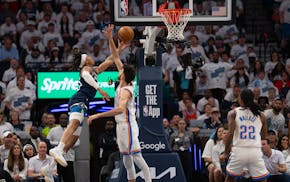
Scoggins: Finch's next challenge is to unleash the Wolves' youngsters
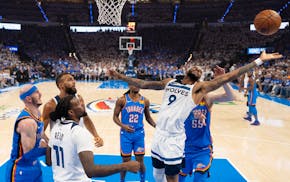
Scoggins: Timberwolves learn just how far behind they are

Scoggins: Chet Holmgren is in the right place at the right time
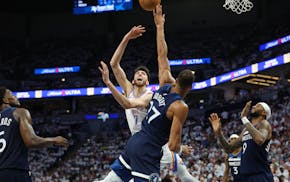
Chet Holmgren remains a basketball unicorn, a status forged in Minnesota and on display in the NBA
